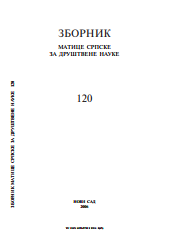ПРАВНА ЕТИКА У ЛЕГИСЛАЦИОНОМ ПРОЦЕСУ
LEGAL ETHIC IN A LEGISLATIVE PROCESS
Author(s): Eva MaksimovićSubject(s): Law, Constitution, Jurisprudence, Ethics / Practical Philosophy
Published by: Матица српска
Keywords: right; moral; legislation process; legislative decisions; legislative arguments; ethical arguments; rational legislator; the moral minimum in law;
Summary/Abstract: Mutual relatedness of law and morality appears at three levels of legal order (legislature, application of law and interpretation of law); since law and morality have a common origin and common goal, every legislative decision at the same time represents a political decision, and thus the realization of the goals of social policy. Arguments for making legislative decisions always have an ethical pretext, although the very notion of morality changed in time. Ethical arguments could be sensu stricte also ethically relevant, which was noticed by numerous theoreticians. For several years, there has been a theoretical discourse about that issue among sociologists, philosophers of morality and, above all, legal theoreticians. In that discourse, moral arguments surpass all other reasons, although the principles of differentiation of legal and moral norms are more or less agreed upon. Another controversial issue is if, and to which degree, it is possible and permissible to pass moral laws analogically to classical legislature. People also talk about „moral legislature" which reflects the specificity of the relation between law and morality in the legislative process. It is a general conclusion that the rational legislator in the legislating process has to start from the principles of law as a moral minimum.
Journal: Зборник Матице српске за друштвене науке
- Issue Year: 2006
- Issue No: 120
- Page Range: 227-233
- Page Count: 7
- Language: Serbian

